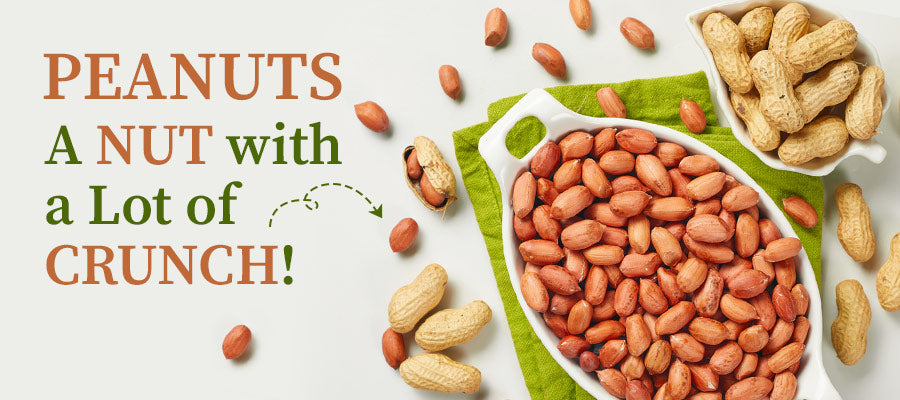Peanuts are more than just a snack to enjoy with tea or between meals. With the right portion and preparation, peanuts can become a smart addition to a healthy diet—especially for someone living with diabetes, managing weight, or focusing on heart health.
Many people often ask, “Are peanuts good for diabetics?” The answer is yes—but it depends on how much is eaten and how peanuts are included in the daily diet.
Let’s explore how peanuts can support blood sugar control, heart wellness, and weight management.
Are Peanuts Good for Diabetics?
Yes—peanuts can be a helpful food for managing blood sugar levels.
One of the main reasons is the low glycemic index (GI) of peanuts, which is around 14. That means peanuts do not raise blood sugar quickly after eating. Instead, digestion happens slowly, offering steady energy and reducing the chances of sudden sugar spikes.
Each handful of peanuts contains:
- Fiber, which slows sugar absorption
- Protein, which supports steady energy
- Healthy fats, which help the body use insulin better
- Magnesium, a mineral that supports blood sugar regulation
Peanuts make a great in-between-meal option for someone who experiences energy crashes or sugar cravings.
Peanuts and Heart Health
Heart health and diabetes go hand in hand. High blood sugar over time can increase the risk of heart disease—but certain foods can help protect the heart naturally.
Peanuts contain monounsaturated and polyunsaturated fats—often referred to as “good fats”—which help reduce bad cholesterol (LDL) and support overall heart function.
Peanuts also provide:
- Magnesium and potassium, which help control blood pressure
- Antioxidants, which reduce inflammation
- Arginine, an amino acid that supports healthy blood flow
Including peanuts as part of a clean, balanced diet can be one way to support both heart and blood sugar health at the same time.
Peanuts for Weight Loss and Management
Despite being high in calories, peanuts can still be a useful part of a weight-friendly diet. That’s because peanuts are filling. A small portion can keep hunger in check and reduce the urge to overeat later in the day.
Here’s why peanuts support healthy weight management:
- The fiber and protein content helps with fullness
- Peanuts offer long-lasting energy, which helps avoid constant snacking
- Replacing junk food with peanuts can cut back on unhealthy fats and sugars
People trying to lose weight or avoid gaining weight often find that peanuts satisfy cravings without throwing off their goals.
Peanut Nutrition at a Glance (Per Fistful / ~30g)
- Calories: Around 160 calories per fistful (roughly 30g)
- Protein: 7g
- Carbohydrates: 5g
- Fiber: 2.5g
- Fats: 14g (mostly heart-healthy fats)
- Rich in: Magnesium, potassium, B vitamins
A simple fistful of peanuts offers a good mix of protein, healthy fats, and fiber that helps support energy, immunity, and blood sugar balance—making them a smart snack, especially for people managing diabetes.
How to Add Peanuts to Daily Meals
Peanuts are incredibly versatile and easy to enjoy in many forms. Here are a few healthy ideas:
- Snack on a dry-roasted, unsalted handful of peanuts between meals
- Add crushed peanuts to salads, millet dishes, or steamed vegetables
- Spread natural peanut butter (look for 100% peanuts—no added oils or sugars) on fruit slices or whole grain bread
- Make peanut chutney to enjoy with dosa, idli, or rotis
- Mix peanuts with roasted seeds and a few raisins for a homemade trail mix
Stick with simple, whole peanuts and skip the salted or sugar-coated ones for the most benefit.
What Kind of Peanuts Are Best?
Choosing the right form makes all the difference:
- Raw peanuts are nutritious, but easier to digest when soaked or roasted
- Dry-roasted peanuts are great for snacking—no oil, just clean crunch
- Natural peanut butter should have just one ingredient: peanuts
Avoid options that include added sugar, salt, hydrogenated oils, or artificial flavors.
What’s the Ideal Portion?
A good rule of thumb:
- About one closed handful (30 grams) of peanuts per day
- Or 1–2 tablespoons of natural peanut butter
More than this regularly can add extra calories and may cause bloating in sensitive stomachs.
A Few Things to Keep in Mind
Peanuts offer many benefits, but a few precautions are helpful:
- Avoid salted or fried peanuts—too much salt or oil cancels out the health value
- People with peanut allergies should avoid them completely
- Some may feel heavy or bloated—starting with a small amount can help gauge tolerance
Always choose fresh, plain peanuts when possible.
So, Are Peanuts Good for Diabetics?
Yes. Peanuts can support:
- Blood sugar stability due to their low GI and fiber
- Heart health through good fats and antioxidants
- Weight management by providing fullness and energy
Peanuts are easy to carry, affordable, and versatile enough to fit into almost any kind of meal plan.
Try This Simple Swap Today
While peanuts are healthy and helpful, especially for people managing diabetes, it’s important to keep the portion size in check.
Disclaimer: For those on a health reversal journey (such as reversing diabetes or improving insulin sensitivity), remember that even healthy foods can have reverse effects if eaten in excess. Always listen to your body, eat mindfully, and if needed, consult your healthcare provider or nutritionist for personalized guidance.
Want more guidance on how to include nuts, millets, or natural foods in your diet? Just ask—we’re here to help you build a balanced and mindful lifestyle.
Buy Best Peanuts






















